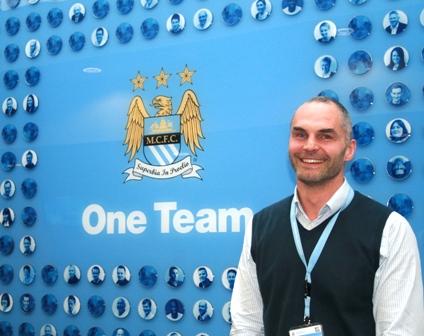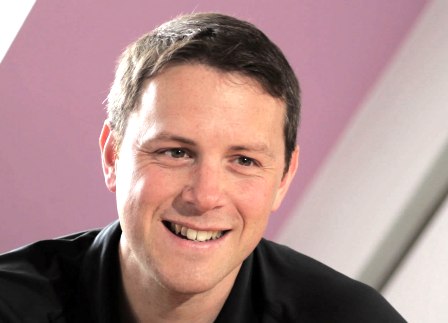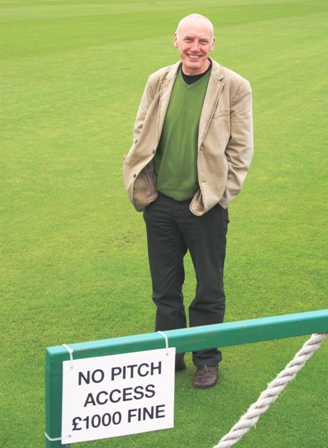
Nic Scott: surrounded by City's finest en route to tough coaching considerations

Keir Worth: England Squash and Racketball's finest

Mick Owen: a highly experienced coach with a contrary streak
Coaching’s glass ceiling: a debate with transparent aims
With Gary Neville getting his first coaching job as the England manager’s assistant and former international Mike Catt being called in to the national rugby coaching team to replace former international Andy Farrell, it seemed like a good time to convene a round table to discuss elite coach development pathways, or the lack of them.

Nic Scott: surrounded by City's finest en route to tough coaching considerations

Keir Worth: England Squash and Racketball's finest

Mick Owen: a highly experienced coach with a contrary streak
Members of The Leisure Review’s extended coaching family will remember that at the end of last year we were asked to draft a report to the parliamentary All Party Group on Sport on the state of coaching in the UK. We canvassed the opinion of 111 coaches, wrote the document and sent it to London. Unfortunately, the chair of the group has been very ill and that, plus changes to his staff team, has meant that the paper is still on their ‘to do’ list.
As David Brailsford is wont to say, “These things happen and we move on” and as a number of issues that came out of the consultation piqued our interest we decided to pursue them without parliamentary support. The first of these was the hypothesis proposed by Nic Scott, late of the Rugby Union and now at Manchester City, that elite coaches are selected from the ranks of elite performers and that a glass ceiling exists which prevents the progress of excellent coaches who can not boast a significant performance background.
Given that Scott’s work base is at the heart of Sport City, it made sense to meet in Manchester and invite interlocutors from the neighbourhood. England Squash and Racketball’s Keir Worth and Andy Heald from Premier Sport, an old friend of TLR and the veteran of more than one Coaching Insight joined us. As bad luck would have it, Andy got caught up with meetings on the day, which meant only Scott, Worth and TLR’s coaching correspondent, Mick Owen, were able to enjoy the event, which was generously supported by Premier Sport, trying to get to the bottom of the glass ceiling contention.
Once we had settled in to a booth at Michael Caine’s basement restaurant and decided from which of the three menus to order, Scott outlined his thesis which has emerged from talking to coaches from both community sport and the elite side who felt they have not had the opportunities that more celebrated names have been offered. Scott’s argument is that all too often very talented coaches are overlooked for non-coaching, often political or financial, reasons, such as the desire to “bring in a big name”.
As an example he highlighted the case of a coach whom he has known since he began working in sports development. The man in question is an excellent coach who always harboured ambitions to work in what the Rugby Football Union call “the professional game”. To coach in the heady world of Aviva Premiership clubs, their academies or even the many male England squads you have either to be Martin Johnson and waved through without a paper qualification or you have to have passed your Level 4 qualification. But, since you have to apply and to be accepted on to the Level 4 and the governing body insist the qualification is only for people working in the professional game, most coaches give up. It took the coach in question 15 years of knocking on the door, or banging on the underside of the glass ceiling, to be accepted. In that time he left his job as a prison officer, became what he calls a “coaching chameleon” and did everything in his own power to follow Mitchell Stone’s advice: “Don’t die with the music in you.”
Faced with this and other stories that Scott and Owen had come across in their combined years in coaching and coach development, Worth had to pick his words with care. Having accepted that, in his sport, they were pleased to see high-performance players becoming high-performance coaches, he addressed the expressed needs of the players. “Our top players will want to know that the coach they are working with has played to a certain level and will ask the question: ‘Who has he coached?’”
Citing the case of Chris Robertson, the current national coach for England, who was, in his day, world number two as a player, Worth said, “A man like Chris has the immediate respect of the players; they want someone who has been through the experience.” With Owen and Scott both making the case that good coaches can come through the ranks, if the system allows it, Worth was adamant that “players want former players”.
Scott accepted that “many elite players go on to be very successful coaches due to the experiences they have had of being coached” and agreed that the budget issue was key: “There are finite resources. The demand from coaches to be allowed to develop their skills and experience working at the top end far outstrips supply.” However, he reiterated his concern that “although there are always going to be those who lose out, invariably it’s those without the ‘right background’”.
The arrival of the second course and a pause for breath allowed the focus to switch to how coaches are developed. With all three men around the table coach educators at one level or another, there was ready agreement that systemically “what was coach education is increasingly coach development” and, although some governing bodies still insisted that “the only valid CPD is their CPD”, many more were seeing what Worth called “the scope for sideways development” and, although the mood was positive, the caveat was expressed that “we are still very dependent on volunteer coaches”, and that with the development of UKCC “qualifications are getting harder and more expertise is required” on the part of those volunteers.
As always when discussing coaching, the disparity between the demands of the governing body and the capacity of the coaching workforce was touched on and the case made that “culturally we don’t appreciate coaches”. Worth invited the table to look beyond these shores to where coaches are more highly valued and bemoaned the loss of excellent coaches, developed by the English system, who have been lured abroad, often to coach at levels well below their capabilities. Conversely, the problem for rugby and football is the influx of foreign coaches into the English game and a consequent exacerbation of the lack of opportunity. The loss of disaffected coaches from “the system” – as evidenced by Sportscoach UK’s coach tracking study – is a major concern.
As pudding was followed by coffee, the discussion ranged far beyond its original remit but, as Messrs Scott and Worth hurried off to appointments with colleagues and the Olympic Torch respectively, two conclusions were unavoidable. The first was that opportunities to talk to fellow coaches from other contexts are a valuable, if rare occurrence. The second that, however much it wrankles with people below the coaching glass ceiling, for the foreseeable future they are stuck with another of Brailsford’s bon mots: “It is what it is.”
The Leisure Review, July/August 2012
© Copyright of all material on this site is retained by The Leisure Review or the individual contributors where stated. Contact The Leisure Review for details.
Download a pdf version of this article for printing